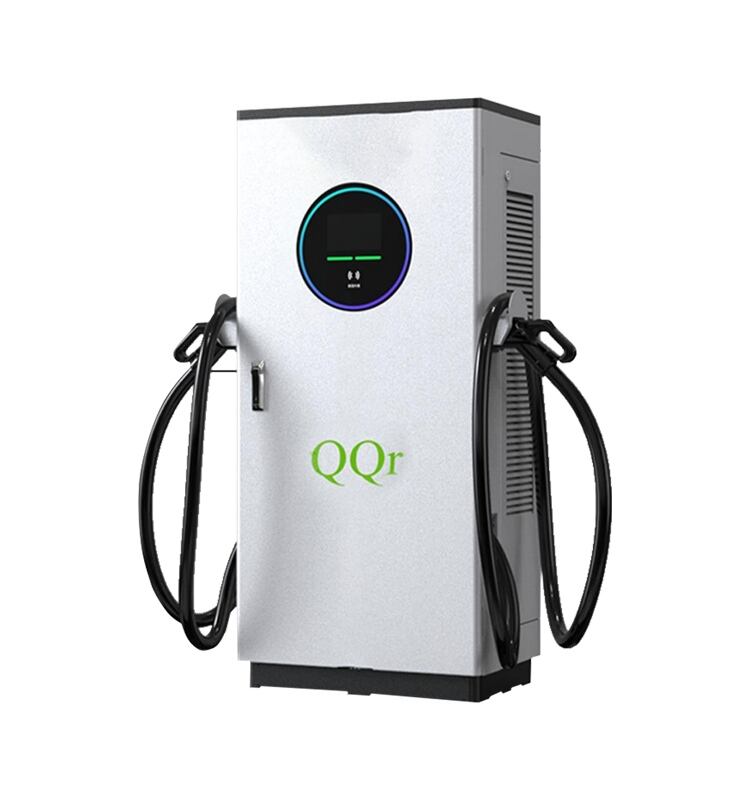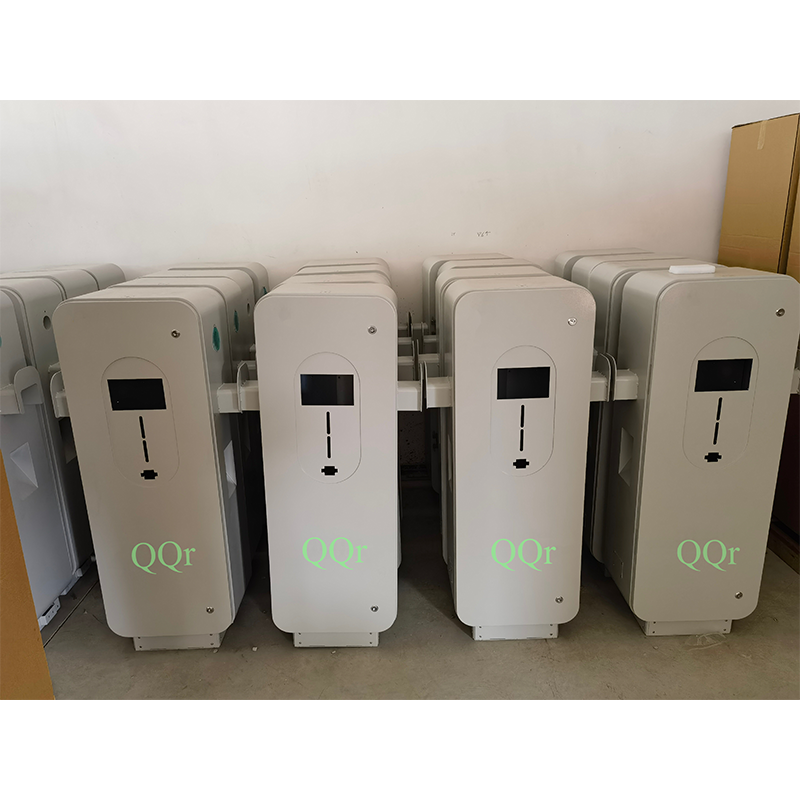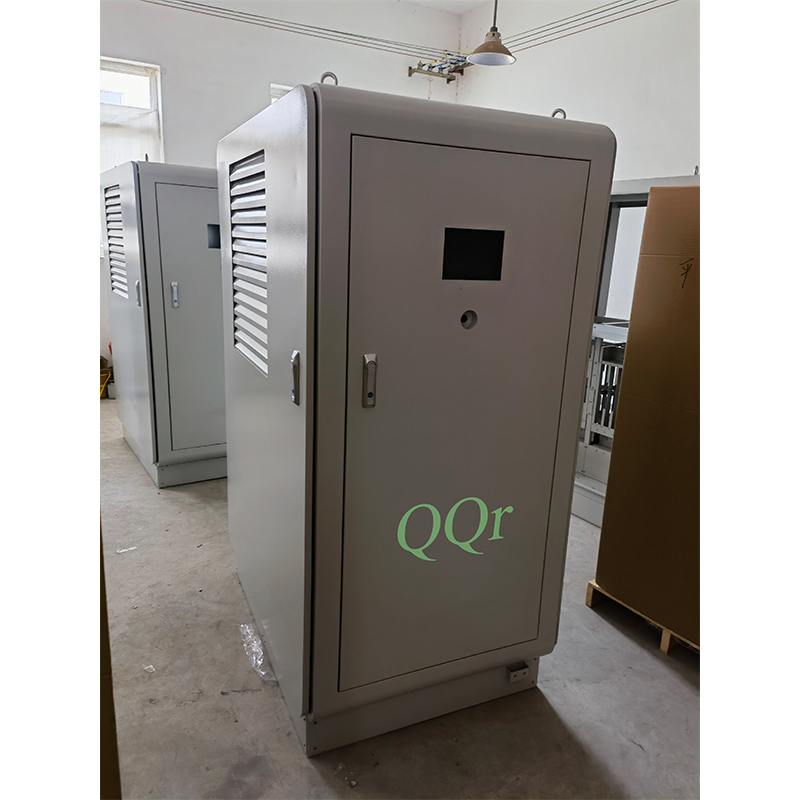Hoe AC EV-laaiers Residensiële Laai Transformeer
Verstaan van Aangepaste Vinnige Laaioplossings
Aangepaste vinnige laaioplossings verwys na laaistelsels wat aangepas is om aan die spesifieke behoeftes van verskillende elektriese voertuig (EV) modelle en omgewingsomstandighede te voldoen. Hierdie oplossings is ontwerp om aan te pas by verskillende laai vereistes en infrastruktuurbeperkings, wat die algehele gebruikerservaring verbeter. Hulle is van kardinale belang om te verseker dat EV's doeltreffend en betroubaar in verskillende omgewings gelaai kan word, van stedelike sentrums tot afgeleë gebiede. Deur aanpasbare ontwerpe in te sluit, voldoen hierdie aangepaste oplossings aan die verskillende battery kapasiteite, laaipoort tipes, en kragvereistes van diverse EV modelle.
Die belangrikheid van op maat gemaakte laaik oplossings kan nie oorbeklemtoon word nie, aangesien dit laaidoeltreffendheid optimaliseer en die breër aanvaarding van EV's ondersteun. Hierdie oplossings spreek die unieke behoeftes van elke EV aan, of dit nou 'n kompakte stadsmotor of 'n swaar voertuig is, en verseker optimale prestasie en lewensduur van die battery. Hulle speel 'n noodsaaklike rol in die oorkoming van die hindernisse tot wye aanvaarding van EV's deur skalbare en buigsame laaiopsies te bied. Uiteindelik bevorder die aanpassing van vinnige laaik oplossings 'n meer naatlose en betroubare EV-ekosisteem, wat meer gebruikers aanmoedig om van tradisionele voertuie na volhoubare elektriese alternatiewe oor te skakel.
Voordele van Aangepaste Vinnige Laaik Oplossings
Aangepaste vinnige laaioplossings bied verbeterde laaispoed vir 'n verskeidenheid elektriese voertuig (EV) modelle. Deur die laaiproces aan te pas by die spesifieke vereistes van elke EV, kan hierdie oplossings die laaityd aansienlik verminder. Byvoorbeeld, sommige op maat gemaakte oplossings het verbeterings in laaieffektiwiteit van tot 30% getoon in vergelyking met standaardlaaiers. Hierdie vermindering in laaityd is van kardinale belang vir sowel individuele EV-eienaars wat gerief soek as vir besighede wat EV-vloot bedryf, aangesien dit lei tot minder stilstand en verhoogde produktiwiteit.
Benewens om die laaiproces te versnel, bied pasgemaakte vinnige laaivervarings doeltreffende kragbestuur wat op die werklike tydvraag aangepas is. Hierdie oplossings optimaliseer energieverbruik deur die kragaflewering aan te pas op grond van die huidige netwerkvraag en EV-eise. Hierdie dinamiese kragbestuur help nie net om energieverspilling te verminder nie, maar ondersteun ook netwerkstabiliteit tydens piektye. So 'n doeltreffendheid in energiegebruik is van kardinale belang vir volhoubare EV-laaivragte, veral namate die aantal EV's voortgaan om te groei.
Boonop, pasgemaakte koppelvlakke in laaistasies verbeter die gebruikerservaring deur funksies soos intuïtiewe ontwerp en persoonlike laaiplane. Gebruikers kan baat vind by koppelvlakke wat met gebruiksgemak in gedagte ontwerp is, wat gebruikers terugvoer integreer om die ervaring voortdurend te verbeter. Studies het getoon dat pasgemaakte koppelvlakke wat persoonlike laaivoorkeure toelaat, gebruikers tevredenheid verhoog deur die laaiproces so eenvoudig en aanpasbaar as moontlik te maak, wat wyer EV-aanvaarding aanmoedig.
Sleutelkenmerke van Pasgemaakte Vinning Laaistasies
Dinamiese hulpbron toewysing is 'n belangrike kenmerk van pasgemaakte vinnige laaistasies, wat hul doeltreffendheid verbeter en wagtye verminder. Deur gebruikersverkeerspatrone te analiseer, kan hierdie stasies dinamies kragverdeling bestuur, hulpbronne effektief toewys waar en wanneer dit die meeste nodig is. Hierdie aanpasbaarheid verseker optimale prestasie oor verskeie laaistasies, wat knelpunte voorkom en die algehele gebruikerservaring verbeter. Sulke stelsels is veral voordelig in gebiede met hoë vraag waar die skommeling van EV-verkeer beduidend is.
Veiligheid is van die grootste belang in pasgemaakte vinnige laaistasies, wat voldoen aan streng veiligheidsstandaarde en -tegnologieë. Hierdie stasies inkorporeer gevorderde veiligheidsprotokolle, soos ISO 15118, om veilige laaierervaringe te verseker terwyl ongeoorloofde toegang voorkom. Nakoming van bedryfnorme is van kardinale belang, aangesien dit waarborg dat alle veiligheidsmaatreëls in plek is om die toerusting, voertuie en, die belangrikste, die gebruikers te beskerm. Deur aan hierdie standaarde te voldoen, handhaaf laaistasies 'n hoë vlak van vertroue en betroubaarheid.
Slim kommunikasie stelsels is integraal tot die funksionering van pasgemaakte vinnige laaistasies, wat verbeterde gebruikerservaring en operasionele doeltreffendheid bied deur IoT-integrasie. Deur 'n netwerk van gekonnekteerde toestelle te gebruik, fasiliteer hierdie stasies naatlose kommunikasie tussen EV's en die laa infrastruktuur. Hierdie konnektiwiteit stel in staat tot regstreekse monitering en beheer, wat gebruikers in staat stel om statusopdaterings te ontvang en toegang te verkry tot persoonlike laai instellings. As gevolg hiervan optimaliseer die integrasie van IoT nie net laai prosesse nie, maar bied dit ook gebruikers 'n intuïtiewe en interaktiewe laai ervaring.
Uitdagings in die Implementering van Pasgemaakte Vinnige Laai Oplossings
Die implementering van pasgemaakte vinnige laaivermoë is dikwels onderhewig aan beduidende infrastruktuurbeperkings. Een van die primêre uitdagings is die beskikbaarheid van elektriese toevoer en die bestaande netwerk kapasiteit. Baie streke mag nie die robuuste elektriese infrastruktuur hê wat nodig is om vinnige laaistasies te ondersteun nie, wat aansienlike krag benodig om doeltreffend te werk. In die besonder mag landelike of onderontwikkelde gebiede hindernisse ondervind weens verouderde netwerkstelsels wat nie in staat is om die verhoogde vraag te hanteer nie. Sonder opgraderings aan elektriese infrastruktuur mag hierdie gebiede sukkel om konsekwente en betroubare laaidiens te bied.
Kompatibiliteitsprobleme met verskillende EV-modelle bied 'n ander uitdaging in die implementering van pasgemaakte vinnige laaioplossings. Die verskil in laaistandaarde en tegnologie onder verskillende vervaardigers bemoeilik stasie-kompatibiliteit met alle EV-tipes. Tegniese uitdagings spruit voort uit verskille in spanning en connector tipes, wat dit moeilik maak om 'n universeel kompatible laai-infrastruktuur te skep. Soos die mark vir elektriese voertuie meer uiteenlopend word, word dit krities om hierdie standaarde te harmoniseer om naatlose laai-ervarings oor modelle te verseker.
Reguleringsnakoming en nakoming van standaarde is van kardinale belang in die implementering van aangepaste vinnige laaistelsels. Om met plaaslike regulasies in lyn te wees, is nie net 'n nakomingskwessie nie, maar 'n noodsaaklikheid om wettige en operasionele hindernisse te vermy. Hierdie vereiste vereis dat laaistasies aan spesifieke standaarde voldoen, wat aansienlik kan verskil tussen streke, wat kompleksiteit aan die ontplooiingsefforte toevoeg. Om deur hierdie regulasies te navigeer en nakoming te verseker, vereis konstante monitering van regulatoriese ontwikkelinge, wat dit 'n hulpbronintensiewe proses maak vir maatskappye wat hul laainetwerke wil uitbrei.
Verkenning van Innovatiewe Produkte vir Vinnige Laai
Die verkenning van innovatiewe produkte vir vinnige laai onthul vooruitgang in tegnologie wat daarop gemik is om aan die vinnig groeiende vraag na elektriese voertuig (EV) infrastruktuur te voldoen. Onder die nuutste produkte is die 120KW DC EV Oplaadstasie , wat uitstaan vir sy super beskermingskenmerke, doeltreffendheid, en gerieflike onderhoud. Hierdie laaier pas aan by moeilike omgewings met 'n IP54 beskermingsvlak en word ondersteun deur 'n dosyn elektriese beskermingsontwerpe om veiligheid te verseker. Dit bied 95% stelseldoeltreffendheid en beskik oor 'n intelligente HMI vir slim, gerieflike laai.

Nog 'n baanbrekende oplossing is die Ultra-Spoedige 480kW Vier-Termynale, Agt-Kanon Gesplitste DC Oplaaioptelling hierdie gevorderde stelsel bied 'n kragtige 480 kW-uitset, wat energie doeltreffend versprei vir gelyktydige laai van verskeie voertuie. Deur dinamiese hulpbron toewysing te benut, verseker dit optimale kragverspreiding tussen agt laaiguns, wat stilstandtyd minimaliseer. Hierdie opstelling is ideaal vir hoë-verkeer areas soos kommersiële laaistasies en snelweg vinnige laai plekke, waar vinnige omkeertyd van kardinale belang is.

Die Hoogdigte Oplaaiknoppunt verteenwoordig die hoogtepunt van innovasie in vinnige laaiprosesse, wat die vereistes van hoëvraag plekke soos stedelike sentrums en openbare vervoersentrums akkommodeer. Hierdie robuuste laaikern bevat 'n sentrale 480 kW kroneenheid, wat krag intelligently tussen agt pistole versprei, wat die wagtye vir EV-bestuurders verminder. Deur gebruik te maak van CAN Bus kommunikasie, bied die kern werklike tyd stelselsmonitering, wat doeltreffendheid en veiligheid verseker.

Hierdie innoverende vinnige laaiprosesse demonstreer die bedryf se reaksie op die uitdagings van EV-infrastruktuurontwikkeling deur doeltreffendheid, veiligheid en gebruikersgerief te prioritiseer, wat uiteindelik laaitye verminder en verbruikerservaringe verbeter.
Toekomstige Tendense in Aangepaste Vinnige Laaiprosesse
Die toekoms van pasgemaakte vinnige laaipunte is sterk verbind aan die integrasie van hernubare energiebronne soos son- en windenergie. Hierdie integrasies ondersteun volhoubare vervoer deur die afhanklikheid van fossielbrandstowwe te verminder en koolstofvrystellings te verlaag. Byvoorbeeld, die gebruik van sonpanele met laaistations kan energie-doeltreffendheid en volhoubaarheid verbeter, wat verseker dat elektriese voertuie (EV's) aangedryf word deur skoon energie. Hierdie integrasie ondersteun nie net omgewingsdoelwitte nie, maar bied ook finansiële voordele, aangesien hernubare energie die operasionele koste van laaistations kan verlaag.
Vooruitgang in laaitegnologie, insluitend draadlose of induktiewe laai-ontwikkelings, is op pad om gebruikersgerief en laaisdoeltreffendheid te revolusie. Draadlose laai elimineer die behoefte aan kabels, wat EV's in staat stel om eenvoudig op te laai deur oor 'n laaipad te parkeer. Hierdie tegnologie verminder die tyd wat aan die koppel en ontkoppel van kabels bestee word, wat die spoed en gemak van die laai-proses verhoog. Boonop kan induktiewe laaistelsels in verskeie plekke geïnstalleer word, wat die toeganklikheid van laaifasiliteite verbreed en meer wye aanvaarding van EV's aanmoedig.
In die ryk van slim stad toepassings, is pasgemaakte vinnige laaipunte gereed om stedelike beplanning en EV-infrastruktuur te verbeter. Deur hierdie oplossings in stadsontwerpe in te sluit, kan munisipaliteite meer doeltreffende mobiliteitsopsies bied, wat verkeersdrukte en besoedeling verminder. Slim netwerke kan dinamies die vraag en verspreiding van elektrisiteit bestuur, wat energieverbruik regoor die stad optimaliseer. Hierdie geïntegreerde benadering verbeter nie net die betroubaarheid van EV-infrastruktuur nie, maar stem ook ooreen met die doelwitte om slimmer, meer gekonnekteerde stedelike omgewings te ontwikkel wat voldoen aan die ontwikkelende behoeftes van elektriese mobiliteit.
Gevolgtrekking: Die Pad Vorentoe vir Pasgemaakte Vinnige Laaipunte
Die toekoms van pasgemaakte vinnige laai is gevorm deur innoverende vooruitgang en 'n verbintenis tot volhoubaarheid. Beduidende vordering kan gevind word in die samesmelting van vinnige laaistelsels met hernubare energiebronne, soos son- en windenergie, om 'n omgewingsvriendelike infrastruktuur te skep wat volhoubare vervoer ondersteun. So 'n integrasie verminder nie net die koolstofvoetspoor nie, maar verbeter ook energie-doeltreffendheid, wat 'n groener planeet vir toekomstige geslagte verseker.
Tegnologiese innovasies in laai, veral draadlose of induktiewe laai, is op die horison en belowe om te transformeer hoe ons elektriese voertuie (EV's) van krag voorsien. Hierdie ontwikkelings is daarop gemik om gebruikersgerief te verbeter, wat naatlose laai-ervarings moontlik maak sonder die behoefte aan kabels. Soos hierdie tegnologieë volwasse word, word daar verwag dat hulle nuwe maatstawwe in laaieffektiwiteit en toeganklikheid sal stel.
Aangepaste vinnige laaioplossings hou enorme potensiaal in die gebied van slim stede. Deur hierdie tegnologieë in stedelike beplanning in te sluit, kan stede hul EV-infrastruktuur en mobiliteit verbeter. Dit sluit die ontplooiing van laaistasies in sleutelposisies in om makliker toegang te fasiliteer en stedelike vervoernetwerke te verbeter. Soos stede ontwikkel, sal die integrasie van hierdie oplossings 'n kritieke rol speel in die ondersteuning van die toenemende aantal EV's en die bevordering van volhoubare stedelike lewe.

 EN
EN
 AR
AR
 BG
BG
 HR
HR
 CS
CS
 DA
DA
 NL
NL
 FI
FI
 FR
FR
 DE
DE
 IT
IT
 PL
PL
 PT
PT
 RO
RO
 RU
RU
 ES
ES
 SV
SV
 TL
TL
 IW
IW
 ID
ID
 LT
LT
 SR
SR
 SK
SK
 SL
SL
 VI
VI
 ET
ET
 HU
HU
 MT
MT
 TH
TH
 TR
TR
 AF
AF
 MS
MS
 GA
GA
 CY
CY
 HY
HY
 AZ
AZ
 KA
KA
 LA
LA
 KK
KK
 UZ
UZ
